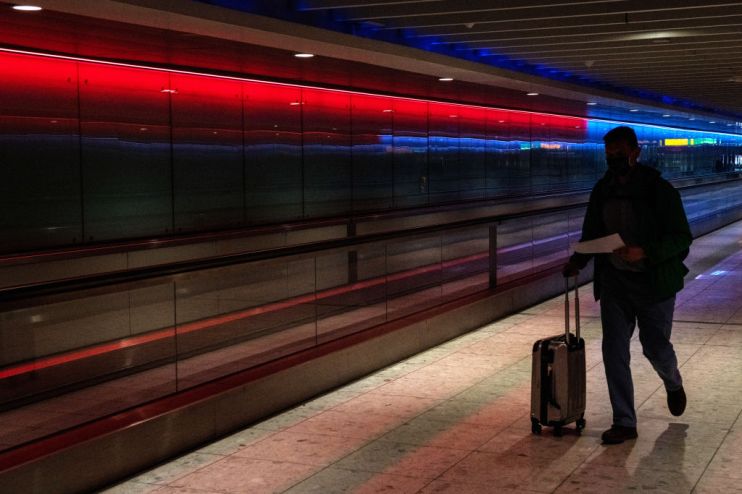Private Covid travel tests: Overpriced, unavailable and unaccredited?

Private Covid PCR test providers will come under investigation from the UK’s advertising watchdog and the government for their hugely variable pricing, while only a fraction can claim to be fully accredited.
Government health officials are to carry out an audit of the 420 listed PCR test providers on the gov.uk website and plan to axe some of the worst companies, according to reports in the Times.
Meanwhile, the Advertising Standards Authority told City A.M. that it was now investigating the listed providers after receiving consumer complaints around “inconsistent pricing”.
After travel restrictions eased for people exiting and entering the UK, soaring demand for Covid PCR tests has left consumers at the mercy of private providers with huge price differentiations and dwindling availability.
Falsely advertised prices
A quick scroll on the government website suggests that many two-swab packages for tests on day two and eight are available for £20, as providers are listed in order of lowest to highest price.
The highest price listed on the gov.uk website on Wednesday was £399 – which equates to around £1600 for a family of four travelling during the school holidays.
But the cheapest travel test providers at the top of the government’s list have the biggest gap between advertised and actual prices, according to a new investigation by consultancy Fideres.
Of the top 50 Covid travel test providers listed on the government website, the average price disparity was £60, with some companies charging as much as seven times more the advertised price, the research found.
“The government is reporting prices that are a small fraction of what most consumers pay, without actually checking if these low prices are available,” said Fideres consultant Paul Vella.
“Not only does this mislead consumers, it can actually steer them into using more expensive providers.”
Fideres also found that of the top cheapest listed PCR test providers, two thirds had no availability for tests during the summer holiday period, forcing consumers to pay more for others.
But even if prices are reviewed, there is a slim chance that travellers will obtain a test from a fully accredited provider.
Only 6 per cent of providers accredited
UKAS, the body in charge of assessing private test providers for travellers, told City A.M. that it has fully accredited only around 25 of the 420 providers on the government’s list – representing around 6 per cent.
This number is “increasing every day”, the body said, but their three stage accreditation process takes around a year for each provider.
UKAS only replaced the Care Quality Commission (CQC) in monitoring private Covid testing in January, following a change in legislation – meaning barely any of the constantly growing list of private providers seeking to capitalise on demand have reached the final stage that certifies their standards and competency.
“The three stage approach for private providers of Covid-19 testing has been developed to enable users to understand where providers are on their journey towards accreditation,” UKAS told City A.M.
But in order to be listed on the government’s official site, all a private test provider currently has to do is make a formal application to UKAS and complete a self-declaration form.
Going all the way to full accreditation under the current system is, however, “extraordinarily heavy and complicated,” said Dr Rachael Liebmann, group medical director at fully UKAS-accredited test provider The Doctors Laboratory.
Accreditation ‘heavy and complicated’
“The regulatory burden that is specifically applied to commercial testing through UKAS has resulted in huge amounts of bureaucracy and bewilderment at the constantly changing requirements,” Dr Liebmann said.
Under the UKAS standards, private test providers are expected to meet laboratory standards – which are unobtainable even for some primary care providers or private GPs.
Yet at the same time, Britain’s medicines regulator extended the emergency use approval for Innova’s rapid Covid tests used for NHS Test & Trace, after the US Food and Drug Administration (FDA) said they “should be thrown in the bin”.
“The regulatory burden being applied only to the commercial sector strikes me as very peculiar. If the argument is that this will lead to a better quality of service, why should there be a better quality of service in the commercial sector than in the NHS,” Dr Liebmann said.
A study released by the government’s Scientific Advisory Group for Emergencies (Sage) showed that Innova’s lateral flow test was capable of picking up just under half of active infections, while separate research by the University of Liverpool found it only identified around 40 per cent of asymptomatic cases.
Scientists have warned that these false negatives could do more harm than good in the spread of coronavirus amongst the UK population.
UK a ‘poster child’ for failing to manage testing
Regulation of private test providers has come under question from the travel industry, as the price for testing people on arrival to the UK remains higher than other European countries and one of the major barriers to foreign travel, according to traveller surveys by The International Air Transport Association (Iata).
“The UK is the poster child for governments failing to adequately manage testing,”said Willie Walsh, Iata’s Director General.
“At best it is expensive, at worst extortionate. And in either case, it is a scandal that the government is charging VAT.”
The Department of Health has been asked for comment on its audit of the private test providers listed on the gov.uk site.